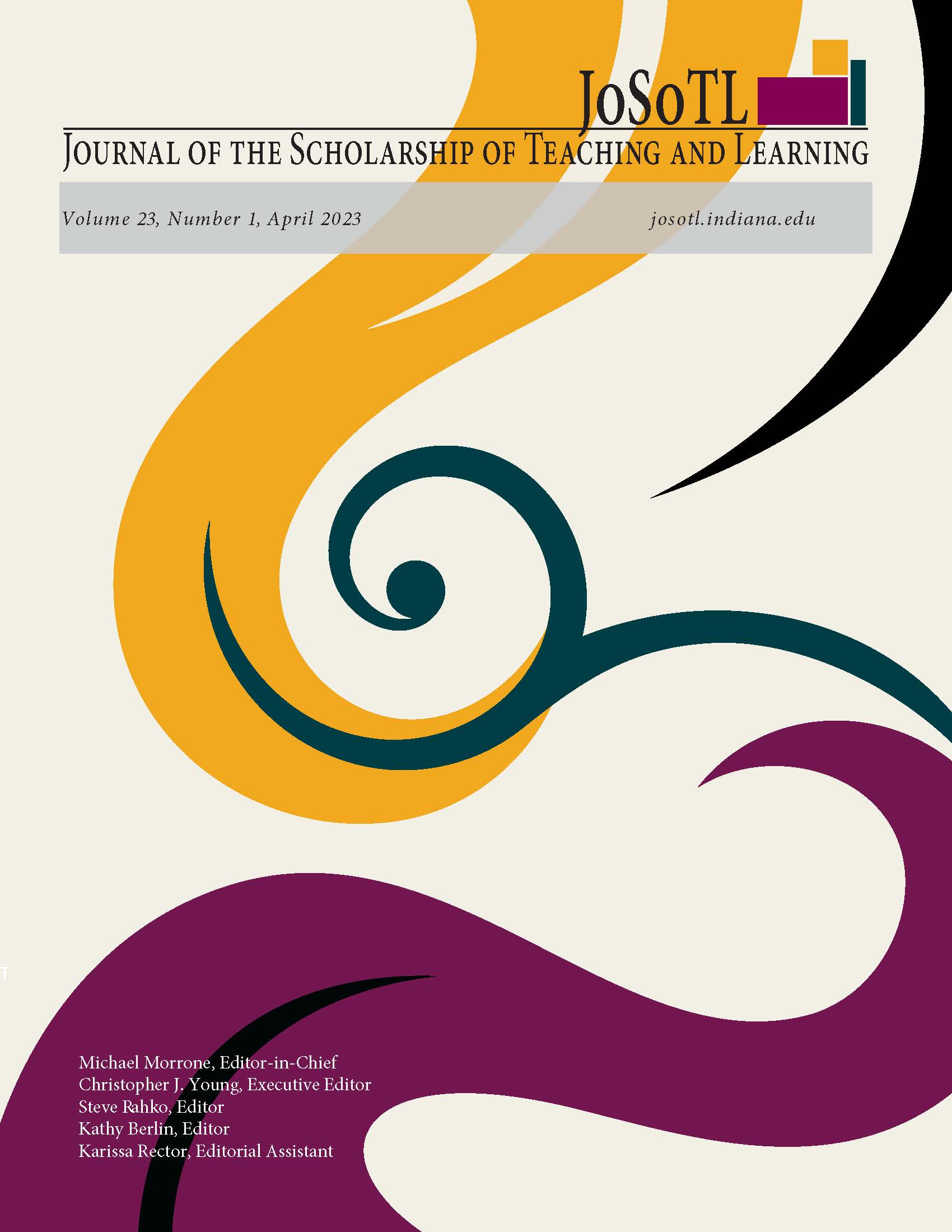Reflections on Undergraduate Research During the COVID-19 Pandemic: The Value of Resilient Pedagogy in Higher Education
Main Article Content
Abstract
This paper utilizes anonymous qualitative survey commentary from seventy-three faculty to explore how perceptions of teaching undergraduate researchers during the COVID-19 pandemic reflect the practice of resilient pedagogy. By examining faculty motivations, experiences in times of disruption, and resiliency beyond the pandemic, this paper contributes to and extends the existing scholarship on resilience and resilient pedagogy in higher education.
Downloads
Article Details

This work is licensed under a Creative Commons Attribution 4.0 International License.
- Authors retain copyright and grant the Journal of the Scholarship of Teaching and Learning (JoSoTL) right of first publication with the work simultaneously licensed under a Creative Commons Attribution License, (CC-BY) 4.0 International, allowing others to share the work with proper acknowledgement and citation of the work's authorship and initial publication in the Journal of the Scholarship of Teaching and Learning.
- Authors are able to enter separate, additional contractual agreements for the non-exclusive distribution of the journal's published version of the work (e.g., post it to an institutional repository or publish it in a book), with an acknowledgement of its initial publication in the Journal of the Scholarship of Teaching and Learning.
- In pursuit of manuscripts of the highest quality, multiple opportunities for mentoring, and greater reach and citation of JoSoTL publications, JoSoTL encourages authors to share their drafts to seek feedback from relevant communities unless the manuscript is already under review or in the publication queue after being accepted. In other words, to be eligible for publication in JoSoTL, manuscripts should not be shared publicly (e.g., online), while under review (after being initially submitted, or after being revised and resubmitted for reconsideration), or upon notice of acceptance and before publication. Once published, authors are strongly encouraged to share the published version widely, with an acknowledgement of its initial publication in the Journal of the Scholarship of Teaching and Learning.
References
Baker, V.L., Pifer, M.J., Lunsford, L.G., Greer, J., and Ihas, D. (2015). Faculty as Mentors in Undergraduate Research, Scholarship, and Creative Work: Motivating and Inhibiting Factors. Mentoring and Tutoring: Partnership in Learning, 23(5): 394-410. https://doi.org/10.1080/13611267.2015.1126164.
Beer, F., and Thompson, J. (2017). Undergraduate and graduate research and creative activities: Faculty's evaluation, time commitment and perceived barriers. A practice report. Student Success 8(1): 73-78.
Bonanno, G.A. (2004). Loss, Trauma, and Human Resilience: Have we underestimated the human capacity to thrive after extremely aversive events? American Psychologist, 59(1): 20-28. https://doi.org/10.1037/0003-066X.59.1.20.
Braun, V., and Clarke, V. (2006). Using thematic analysis in psychology. Qualitative Research in Psychology, 3(2): 77-101.
Brunzell, T., Stokes, H., and Waters, L. (2016). Trauma-informed flexible learning: Classrooms that strengthen regulatory abilities. International Journal of Child, Youth and Family Studies 7(2): 218-239. https://doi.org/10.18357/ijcyfs72201615719.
Crawford, J., Butler-Henderson, K., Rudolph, J., Malkawi, B., Glowatz, M., Burton, R., Magni, P.A., and Lam, S. (2020). COVID-19: 20 countries’ higher education intra-period digital pedagogy responses. Journal of Applied Learning and Teaching, 3(1): 9-28. doi: 10.37074/jalt.2020.3.1.7.
Devaney, J., and Quintana, R. (2020). Laying the Foundation for a Resilient Teaching Community. Inside Higher Ed. July 28, 2021. https://www.insidehighered.com/blogs/learning-innovation/laying-foundation-resilient-teaching-community
Deveau, A.M., Wang, Y., and Small, D.J. (2020). Reflections on Course-Based Undergraduate Research in Organic and Biochemistry during COVID-19. Journal of Chemical Education, 97: 3463-3469. https://doi.org/10.1021/acs.jchemed.0c00787.
Gardner, E. (2020). Resilient Pedagogy for the Age of Disruption: A Conversation with Josh Eyler. Top Hat. July 28, 2021. https://tophat.com/blog/resilient-pedagogy-for-the-age-of-disruption-a-conversation-with-josh-eyler/
Herrman, H., Stewart, D.E., Diaz-Granados, N., Berger, E.L., Jackson, B. and Yuen, T. (2021). What is resilience? The Canadian Journal of Psychiatry 56(5): 258-265. https://doi.org/10.1177/070674371105600504.
Imad, M. (2020). Leveraging the Neuroscience of Now. Inside Higher Ed. July 28, 2021. https://www.insidehighered.com/advice/2020/06/03/seven-recommendations-helping-students-thrive-times-trauma
Jansen, H. (2010). The logic of qualitative survey research and its position in the field of social research methods. Forum Qualitative Sozialforschung/Forum: Qualitative Social Research, 11(2).
Kvale, S., and Brinkmann, S. (2009). Interviews: Learning the Craft of Qualitative Research Interviewing. London: Sage.
MacLeavy, J., Fannin, M., and Larner, W. (2021). Feminism and futurity: Geographies of resistance, resilience and reworking. Progress in Human Geography. https://doi.org/10.1177/03091325211003327.
Morales, D.X., Grineski, S.E., and Collins, T.W. (2017). Faculty motivation to mentor students through undergraduate research programs: A study of enabling and constraining factors. Research in Higher Education 58(5): 520-544. https://doi.org/10.1007/s11162-016-9435-x.
Norris, F.H., Stevens, S.P., Pfefferbaum, B., Wyche, K.E., and Pfefferbaum, R.L. (2008). Community Resilience as a Metaphor, Theory, Set of Capacities, and Strategy for Disaster Readiness. American Journal of Community Psychology, 41: 127-150. https://doi.org/10.1007/s10464-007-9156-6.
Qiang, Z., Obando, A.G., Chen, Y. and Ye, C. (2020). Revisiting Distance Learning Resources for Undergraduate Research and Lab Activities during COVID-19 Pandemic. Journal of Chemical Education, 97: 3446-3449.
Quintana, R. (2021). Teaching During Times of Change. Coursera. July 28, 2021. https://blog.coursera.org/resilient-teaching-during-times-of-change-with-dr-rebecca-quintana-university-of-michigan/
Schwartzman, R. (2020). Performing pandemic pedagogy. Communication Education, 69(4): 502-517. https://doi.org/10.1080/03634523.2020.1804602.
Tange, A.K. (2020). Resilient Design for Remote Teaching and Learning. Thinking About the Humanities. July 28, 2021. https://andreakastontange.com/teaching/resilient-design-for-remote-teaching-and-learning/
Tripepi, M. and Landberg, T. (2021). Undergraduate Research in the Time of COVID-19: A Remote Imaging Protocol for Physically Distanced Students Studying Wildlife. Journal of Microbiology & Biology Education, 22(1): 1-3. https://doi.org/10.1128/jmbe.v22i1.2485.
Wang, C., Bauer, M., Burmeister, A.R., Hanauer, D.I., and Graham, M.J. (2020). College Student Meaning Making and Interest Maintenance During COVID-19: From Course-Based Undergraduate Research Experiences (CUREs) to Science Learning Being Off-Campus and Online. Frontiers in Education, 5: 1-10. https://doi.org/10.3389/feduc.2020.590738.
Yowler, J.Y., Knier, K., Joncas, Z.W., Ehlers, S.L., Ekker, S.C., Ryes, F.G., Horazdovsky, B.F., Mueller, G., Gomez, A.M., Sood, A., Sussman, C.R., Scholl, L.M., Weavers, K.M., and Pierret, C. (2021). Rapid adaptation and remote delivery of undergraduate research training during the COVID 19 Pandemic. bioRxiv: doi: 10.3390/su13116133.
